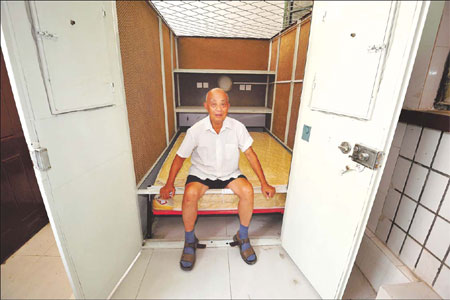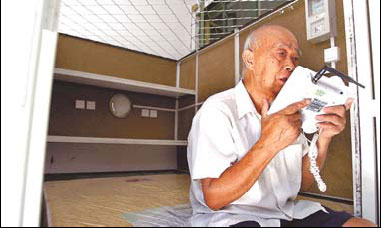Profiles
China's fathers of invention in modern times
By Liu Yujie and Wang Wei (China Daily)
Updated: 2010-10-17 11:19
 |
Large Medium Small |
 |
|
Huang Rixin's capsule apartments are designed for newly graduated job-seekers who he says, remind him of his own grand-child. [Photo/CFP] |
For Huang Rixin, it was more social conscience which spurred his need to invent. Although he has been officially retired for more than 10 years, the former designer of hydro-electric dams has never been busier.
All day, every day, he labors on searching for ways to improve and upgrade his plans for capsule apartments - an invention that puts him squarely in the limelight lately.
He had read about the plight of Beijing's "ant tribe" - young job-seekers fresh from college that had flocked to the capital in search of fame, fortune or merely a steady job in the land of opportunity.
More often than not, they find themselves at the bottom rung of the job market, making less than 2,000 yuan ($301) a month and living 8 to 10 in a room in cramped conditions.
Reports said there were at least 100,000 of these young people in Beijing and Huang felt for them.
He had also read about capsule hotels in Japan where tiny rooms for one provided basic amenities and privacy. That was when he started thinking how he could design a little apartment for the "ants" along the same lines.
"These young people are the same age as my own grandchild and I felt sad to see them live this way. I wanted to help them," he says.
"Capsule apartments work where land resources are limited. I believe it will work in big cities such as Beijing and Shanghai."
Huang launched his first experiment on the third floor of a three-story building in Beijing's Haidian district, where he rented three rooms and renovated them into eight units.
Each unit was only big enough to accommodate a single bed, but at 250 yuan per month, they were snapped up immediately.
 |
|
Huang Rixin designed the capsule apartment because he empathized with the young but penniless new graduates flocking to Beijing to look for their dream jobs. [Photo/China News Service] |
But things did not go as planned. Two months later, the units were removed after new rental regulations stipulated that per capita living space in a single-story property must be no less than 4 square meters.
Currently Huang is working on bigger and better-equipped third generation capsule units. These are in Mentougou outside the West Fifth Ring Road, just 20 km from his original project.
Here, Huang has divided a 53-square-meter space into eight "capsules" - seven are single-bed rooms and one has a double-bed.
The capsule apartments share kitchen, shower and living room facilities.
In addition, the new apartments use fireproofing and soundproofing foam bricks to replace reinforced concrete, reducing the cost per unit from 2,500 yuan by more than half to just 1,000 yuan.
"It took two or three days to finish one steel structured apartment," Huang says. "By using foam bricks we can build dozens in one month."
He hopes to lease out the double-bed unit for around 450 yuan and single-bed units for 350 yuan.
On the pension they have, Huang and his wife could have lived comfortably after retirement. Instead, his capsule apartment project has cost him more than 50,000 yuan in savings.
But the inventor is stoic.
"I won't leave a penny to my children like most Chinese parents do. I want to use my money to do something really meaningful."
Right now, he is more worried about sustaining his invention, and he hopes real estate developers will become interested and purchase the plans from him, making such homes available to the masses in future.
Perhaps Huang has a good chance of marketing his invention, for as Song Youzhou observes, many inventions fail because there is no market demand.
But China's fathers of invention seem equally motivated by higher ideals, and their genius seem to be inspired by social responsibility and a legacy for posterity, more than any commercial success.